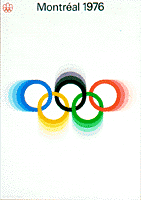HISTORY OF THE MODERN OLYMPICS
Montreal, Canada, 1976
 |
| Olympic posters from the Archives, Olympic Museum Lausanne, from the book The Olympic Spirit, published by Tehabi Books |
More than 6,000 athletes competed, representing 88 nations. The track-and-field competition saw three double gold medal performances: distance runner Lasse Virén of Finland repeated his 1972 double of the 5,000- and 10,000-metre events; Cuban Alberto Juantorena won the 400- and 800-metre runs; and Soviet runner Tatyana Kazankina earned gold medals in the 800- and 1,500-metre runs. East German Waldemar Cierpinski won the first of his consecutive Olympic marathon gold medals. Legendary hurdler Edwin Moses of the United States earned his first gold medal.
The swimming competition was dominated by the American men and the East German women. The American men, led by John Naber (who took four gold medals), won all but one event and set 11 world records. Kornelia Ender, winner of four gold medals, led the East German team as the that country took 10 of the 11 individual events and set eight world records.
Nadia Comaneci of Romania won three gold medals and scored a perfect 10 seven times in the gymnastics competition. Women competed in basketball and rowing for the first time. Pertti Karppinen of Finland won the first of his three career gold medals in rowing. The U.S. boxing team, starring Leon and Michael Spinks and Ray Leonard, won 5 of the 11 divisions.
Introduction * Early History * Revival of the Olympics * Organization of the Modern Games